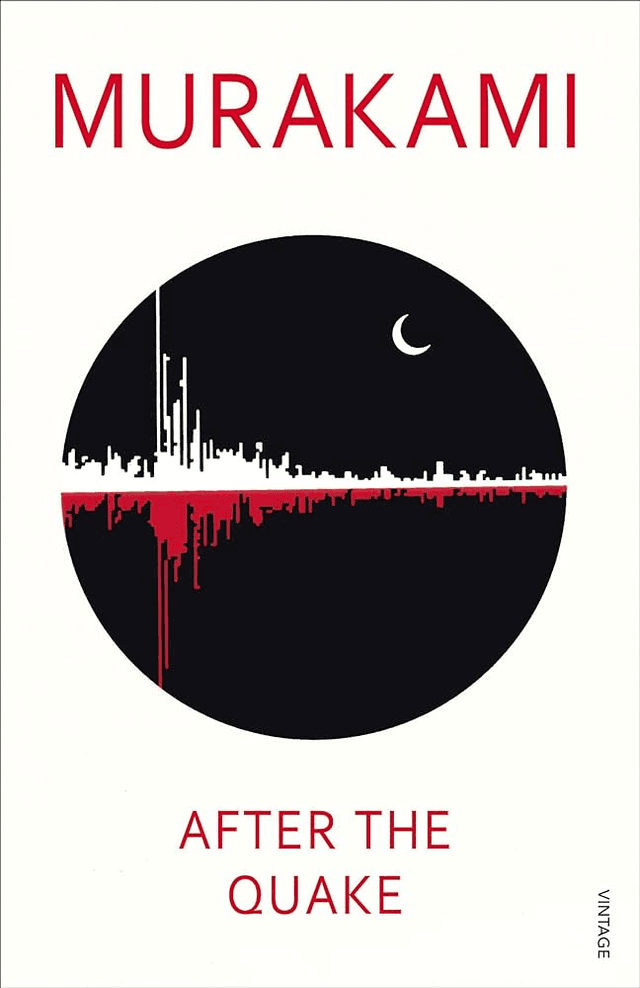After the Quake vs. What I Talk About When I Talk About Running: A Memoir
After the Quake
An electronics salesman who has been deserted by his wife agrees to deliver an enigmatic package— and is rewarded with a glimpse of his true nature. A man who views himself as the son of God pursues a stranger who may be his human father. A mild-mannered collection agent receives a visit from a giant talking frog who enlists his help in saving Tokyo from destruction. The six stories in this collection come from the deep and mysterious place where the human meets the inhuman—and are further proof that Murakami is one of the most visionary writers at work today.
What I Talk About When I Talk About Running: A Memoir
While training for the New York City Marathon, Haruki Murakami decided to keep a journal of his progress. The result is a memoir about his intertwined obsessions with running and writing, full of vivid recollections and insights, including the eureka moment when he decided to become a writer. By turns funny and sobering, playful and philosophical, here is a rich and revelatory work that elevates the human need for motion to an art form.

| Item | Votes | Upvote |
|---|---|---|
| No pros yet, would you like to add one? | ||
| Item | Votes | Upvote |
|---|---|---|
| No cons yet, would you like to add one? | ||
| Item | Votes | Upvote |
|---|---|---|
| Easy read | 1 | |
| Learn how Murakami thinks about work, life and running | 1 | |
| Inspires you to run | 1 | |
| Inspires you to do your best work | 1 | |
| Murakami's reflections on aging | 1 |
| Item | Votes | Upvote |
|---|---|---|
| No cons yet, would you like to add one? | ||
Frequently Asked Questions
'What I Talk About When I Talk About Running' and 'After the Quake' offer different experiences for readers. 'What I Talk About When I Talk About Running' is a memoir that combines Murakami's reflections on running and writing, providing insights into his personal life and philosophy. It is praised for being an easy read and inspiring readers to pursue their best work and take up running. 'After the Quake,' on the other hand, is a collection of six short stories that delve into surreal and mysterious narratives, showcasing Murakami's visionary storytelling. The choice between the two depends on whether you prefer a personal memoir with motivational elements or a series of imaginative and thought-provoking stories.
'What I Talk About When I Talk About Running' is generally considered more inspirational as it provides insights into Murakami's mindset about work, life, and running. The memoir is noted for inspiring readers to run and do their best work, as well as offering reflections on aging. 'After the Quake,' while imaginative and thought-provoking, is less focused on personal motivation and more on exploring deep and mysterious themes through its short stories.
'After the Quake' is a collection of six short stories by Haruki Murakami. The stories revolve around characters dealing with the aftermath of the Kobe earthquake. An electronics salesman who has been deserted by his wife agrees to deliver an enigmatic package; a man who believes he is the son of God pursues a stranger who may be his human father; and a mild-mannered collection agent receives a visit from a giant talking frog who enlists his help in saving Tokyo from destruction. These stories explore the deep and mysterious intersection of the human and the inhuman.
'After the Quake' is authored by Haruki Murakami, a renowned Japanese writer known for his unique blend of surrealism, magical realism, and contemporary themes. He is one of the most visionary writers at work today.
The main themes in 'After the Quake' include human vulnerability, the impact of natural disasters, existentialism, and the intersection between the human and the inhuman. Murakami explores how these events shape the characters' lives and their perceptions of reality.
'After the Quake' belongs to the genres of literary fiction and magical realism. The stories often contain surreal and fantastical elements that blur the lines between reality and imagination.
'What I Talk About When I Talk About Running: A Memoir' by Haruki Murakami is a reflective and philosophical memoir that chronicles his experiences training for the New York City Marathon. The book intertwines his obsessions with running and writing, offering vivid recollections and insights, including the pivotal moment when he decided to become a writer. It is by turns funny, sobering, playful, and philosophical, exploring the human need for motion as an art form.
Pros of 'What I Talk About When I Talk About Running: A Memoir' include: it is an easy read, provides insights into how Murakami thinks about work, life, and running, inspires readers to run and do their best work, and includes Murakami's reflections on aging. There are currently no listed cons.
Haruki Murakami is a renowned Japanese author known for his contemporary fiction works that often blend elements of the fantastical with the mundane. His notable books include 'Norwegian Wood,' 'Kafka on the Shore,' and '1Q84.' Murakami is also an avid runner, and his memoir 'What I Talk About When I Talk About Running' reflects his passion for both writing and running.
'What I Talk About When I Talk About Running: A Memoir' explores themes such as the intersection of physical and mental discipline, the pursuit of personal goals, the relationship between running and writing, and reflections on aging. Murakami delves into how running has influenced his writing process and overall outlook on life.
You should read 'What I Talk About When I Talk About Running: A Memoir' if you are interested in personal growth, enjoy reflective and philosophical writing, or are a fan of Haruki Murakami's works. The memoir provides unique insights into Murakami's life, his approach to both running and writing, and offers inspiration to pursue your passions with dedication.














